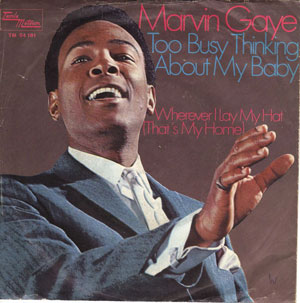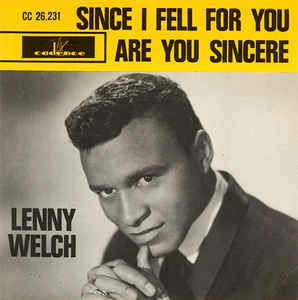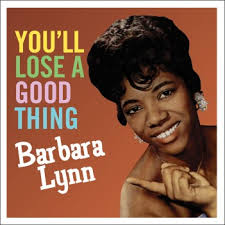Related Research Articles

"I Can't Get Next to You" is a 1969 number-one single recorded by The Temptations and written by Norman Whitfield and Barrett Strong for the Gordy (Motown) label. The song was a number-one single on the Billboard Top Pop Singles chart for two weeks in 1969, from October 18 to October 25, replacing "Sugar, Sugar" by The Archies and replaced by "Suspicious Minds" by Elvis Presley. The single was also a number-one hit on the Billboard Top R&B Singles for five weeks, from October 4 to November 1, replacing "Oh, What a Night" by The Dells, and replaced by another Motown song, "Baby I'm For Real" by The Originals.

"Too Busy Thinking About My Baby" is a Motown song written by Norman Whitfield, Barrett Strong, and Janie Bradford. The song was first recorded by The Temptations as a track on their 1966 album Gettin' Ready. Eddie Kendricks sings lead on the recording, which was produced by Whitfield. Jimmy Ruffin also recorded a version with The Temptations providing background vocals in 1966. It remained unreleased until 1997.
"Little Bitty Pretty One" is a 1957 rock and roll song written and originally recorded by Bobby Day. The same year, the song was popularized by Thurston Harris. Produced by Aladdin Records, and featuring the Sharps on backing vocals, Harris' version reached No. 6 on the U.S. Billboard Best-Sellers chart and No. 2 on the R&B chart.

"Breaking Up Is Hard to Do" is a song recorded by Neil Sedaka, co-written by Sedaka and Howard Greenfield. Sedaka recorded this song twice, in 1962 and 1975, in two significantly different arrangements, and it is considered to be his signature song. Between 1970 and 1975, it was a top-40 hit three separate times for three separate artists: Lenny Welch, The Partridge Family and Sedaka's second version.

"That Girl" is a song by American R&B singer and songwriter Stevie Wonder. The song was the leading single from Wonder's album-era 1982 greatest-hits compilation, Stevie Wonder's Original Musiquarium I, as one of four newer songs from the collection. The song spent nine weeks at number one on the Billboard R&B singles chart – the longest time a Stevie Wonder single spent at the top spot – and reached number four on the Billboard Hot 100.

"Let It Be Me" is a popular song originally published in French in 1955 as "Je t'appartiens" interpreted by Gilbert Bécaud. It became popular worldwide with an English version by the Everly Brothers and later with the duet by Betty Everett and Jerry Butler.

"Since I Fell for You" is a blues ballad was composed by Buddy Johnson in 1945 and was first popularized by his sister, Ella Johnson, with Buddy Johnson and His Orchestra.

"Still" is a 1979 song by the soul music group the Commodores. It was released as a single on Motown Records with "Such a Woman" as the B-side. The song appears on their 1979 hit album Midnight Magic. It is notable for being their last No. 1 before Lionel Richie went solo.

"Another Saturday Night" is the title of a 1963 hit single by Sam Cooke from the album Ain't That Good News. The song was written by Cooke while touring in England when staying in a hotel where no female guests were allowed. It reached No. 10 on the Billboard Hot 100 and was No. 1 on the R&B chart for a single week. In the UK, the song peaked at No. 23 on the UK Singles Chart.

"C'mon Marianne" is a song composed by L. Russell Brown and Raymond Bloodworth and popularized by The Four Seasons in 1967. Produced by Bob Crewe, the single was the last Four Seasons single to reach the Top Ten of the Billboard Hot 100 chart in the 1960s, and their last Top Ten hit until "Who Loves You" in 1975.
"It's Just a Matter of Time" is a popular song written by Brook Benton, Clyde Otis, and Belford Hendricks. The original recording by Benton topped the Billboard rhythm & blues chart in 1959 and peaked at No. 3 on the Hot 100 pop chart, the first in a string of hits for Benton that ran through 1970.

"You'll Lose a Good Thing" is a popular song written by rhythm and blues artist Barbara Lynn Ozen, who, performing as Barbara Lynn, scored a 1962 Top 10 hit, peaking at #8 and also the number 1 spot on the R&B charts, with her bluesy rendition of the song.

"Love Ballad" is a song by R&B/Funk band L.T.D.. Jeffrey Osborne is the lead singer.

"Love or Let Me Be Lonely" is a pop song recorded by the soul group The Friends of Distinction and released as a single in early 1970. The song was a multi-format success, peaking in the top 10 of the Billboard Hot 100 at #6 on May 1, 1970 and at #13 on the R&B chart. On the Adult Contemporary singles charts, "Love or Let Me Lonely" went to #9. The song is ranked as the 63rd biggest hit of 1970.

"What Cha Gonna Do with My Lovin'" is a 1979 single by Stephanie Mills from the album of the same name. It became a hit, reaching No. 22 on the Billboard Hot 100. It was a Top 10 hit on the R&B chart, as well as a minor hit in Canada.
"Next Door to an Angel" is a rock and pop song written by Neil Sedaka and Howard Greenfield and recorded by Neil Sedaka in 1962. It was issued by RCA Victor Records. It reached No. 5 on the Billboard Hot 100 in late 1962. "Next Door to an Angel" also went to No. 19 on the Hot R&B Singles chart. It was Sedaka's last appearance on the American Top 10 until "Laughter in the Rain" in late 1974.

"Don't Take Away the Music" is a hit song by R&B/disco group Tavares, released in the fall of 1976. It peaked at number 34 on the US Billboard Hot 100 singles chart and at number four in the UK. Along with the track "Heaven Must Be Missing an Angel", the song spent two weeks at number 1 on the Hot Dance Club Play chart.

"Almost Over You" is a 1983 single by Scottish singer Sheena Easton from her Best Kept Secret LP. It was written by Jennifer Kimball and Cindy Richardson. The single reached number 25 on the Billboard Hot 100, while its Adult Contemporary peak was number 4. In Canada, the song reached number 35 and number one on the Adult Contemporary chart. The lyrics tells of a woman who almost overcame the pain, misery, and shattered dreams her former lover gave to her, which suggests the title.

"History Repeats Itself" is a 1966 narrated song written and recorded by Buddy Starcher. It became his greatest hit, reaching number 39 on the U.S. Billboard Hot 100 and number two on the Country singles chart.
"No Love at All" is a song written by Johnny Christopher and Wayne C. Thompson. It was recorded by American country music artist Lynn Anderson and released as a single in June 1970 via Columbia Records.
References
- ↑ BMI entry for song Accessed September 3, 2010
- ↑ Whitburn, Joel (2004). Top R&B/Hip-Hop Singles: 1942-2004. Record Research. p. 392.
- ↑ Whitburn, Joel (2004). The Billboard Book Of Top 40 Country Hits: 1944-2006, Second edition. Record Research. p. 371.
- ↑ Whitburn, Joel (1993). Top Adult Contemporary: 1961–1993. Record Research. p. 250.
- ↑ "Hot Country Songs – Year-End 1978". Billboard. Retrieved August 1, 2021.
- ↑ Joel Whitburn's Top Pop Singles 1955–1990 - ISBN 0-89820-089-X
- ↑ Joel Whitburn's Top Pop Singles 1955–1990 - ISBN 0-89820-089-X
- ↑ Joel Whitburn's Top Pop Singles 1955–1990 - ISBN 0-89820-089-X
- ↑ Whitburn, Joel (2004). The Billboard Book Of Top 40 Country Hits: 1944-2006, Second edition. Record Research. p. 284.